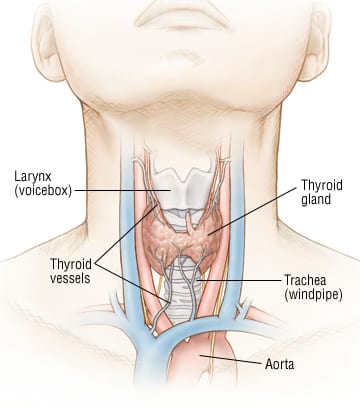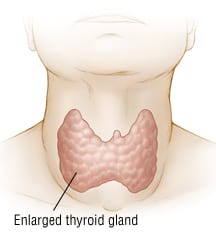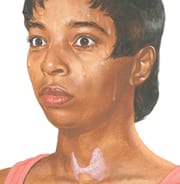Patient Basics: Hyperthyroidism
Originally published by Harvard Health.
What Is It?
Hyperthyroidism is a condition in which your body makes too much thyroid hormone. It is also called overactive thyroid.
Thyroid hormones are made by the thyroid gland. The thyroid gland is located in the lower front of the neck.
Thyroid hormones regulate the body’s energy. When levels of thyroid hormones are unusually high, the body burns energy faster and many vital functions speed up.
Hyperthyroidism is usually caused by the thyroid gland producing too much thyroid hormone. The three most common reasons for this are:
- Graves’ disease. Graves’ disease is the most common cause of hyperthyroidism. It is an immune system disorder. The body produces antibodies that cause the thyroid to make and release too much thyroid hormone. If you have a relative with Graves’ disease, you have an increased risk of developing hyperthyroidism.
- Thyroid tumor. A noncancerous thyroid tumor may make and secrete increased amounts of thyroid hormones.
- Toxic multinodular goiter. The thyroid gland is enlarged with many noncancerous thyroid tumors. They secrete increased amounts of thyroid hormone.
Rarely, the condition is caused by the pituitary gland making too much thyroid-stimulating hormone (TSH). This causes the thyroid gland to produce too much thyroid hormone.
Certain types of thyroid inflammation (thyroiditis) can cause short-term hyperthyroidism. This can occur after childbirth or after viral infections, for example.
In very rare situations, excess thyroid hormone can come from a source outside the thyroid. For example, abnormal tissue growth in the ovary can secrete thyroid hormone.
Symptoms of hyperthyroidism also can be caused by taking excessive amounts of thyroid supplements.
Symptoms
Symptoms of hyperthyroidism include:
- Nervousness
- Insomnia
- Dramatic emotional swings
- Sweating
- Tremors
- Increased heart rate
- Frequent bowel movements
- Unexplained weight loss, often despite an increased appetite
- Feeling warm or hot all the time
- Muscle weakness
- Shortness of breath and heart palpitations
- Hair loss
In women, menstrual periods may become less frequent or stop completely. Older people may develop heart failure or chest pain.
When Graves’ disease causes hyperthyroidism, you also may have swelling of tissues behind the eyes. This causes a characteristic protruding, staring appearance.
Diagnosis
Your doctor will examine you. He or she will feel your thyroid for signs of enlargement or abnormal lumps. He or she also may use a stethoscope to listen for increased blood flow into your thyroid gland.
Your doctor will check for additional signs of hyperthyroidism. These include:
- Increased heart rate
- Hand tremor
- Brisk response to tapping with a reflex hammer
- Excessive sweating
- Muscle weakness
- Protruding eyes
If your doctor suspects hyperthyroidism, he or she will order blood tests. These will check your levels of thyroid hormones.
Other diagnostic tests may include:
- Blood tests to check levels of certain antibodies
- An ultrasound of the thyroid
- A thyroid scan
Expected Duration
Hyperthyroidism caused by certain types of inflammation or viral infections (thyroiditis) usually resolves after several months.
Most people with Graves’ disease require long-term treatment. The condition occasionally goes away on its own.
Prevention
Hyperthyroidism caused by taking too much thyroid medication can be prevented. Follow your doctor’s instructions. Periodically get blood tests to check thyroid levels.
Naturally occurring hyperthyroidism cannot be prevented.
Treatment
Most people with hyperthyroidism require beta-blockers such as propranolol (Inderal) or nadolol. Beta-blockers slow the heart rate and reduce the tremor. Beta-blockers are used while more specific therapy takes effect.
Hyperthyroidism is most often treated with anti-thyroid drug therapy. This blocks the formation of thyroid hormones. The most commonly used drug is methimazole.
Radioactive iodine destroys the thyroid. This is a more permanent option. It is used to treat hyperthyroidism caused by Graves’ disease. It is also used to treat thyroid nodules producing too much thyroid hormone.
Another option is surgery to remove part of the thyroid gland. Surgery is rarely used.
Patients treated with radioactive iodine or surgery almost always need thyroid hormone replacement pills.
When To Call A Professional
Call your doctor if you have symptoms of hyperthyroidism or your treatment is not helping your symptoms as much as you expected.
Prognosis
Many people with Graves’ disease who are treated with anti-thyroid drugs have prolonged remissions of their illness.
Radioactive iodine also is an effective treatment for Graves’ disease. It is almost always used in patients with overproducing thyroid nodules.
Many people will develop an underactive thyroid following radioactive iodine treatment. This is called hypothyroidism. This condition is easily treated with daily thyroid replacement medication.
Additional Info
American Thyroid Association, Inc.
6066 Leesburg Pike
Suite 650
Falls Church, VA 22041
Phone: 703-998-8890
Fax: 703-998-8893
http://www.thyroid.org/







![Statin therapy does not prevent osteoporotic fractures [JUPITER trial]](https://www.2minutemedicine.com/wp-content/uploads/2014/12/osteoporosis-e1417474828821-350x250.jpg)